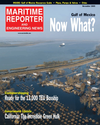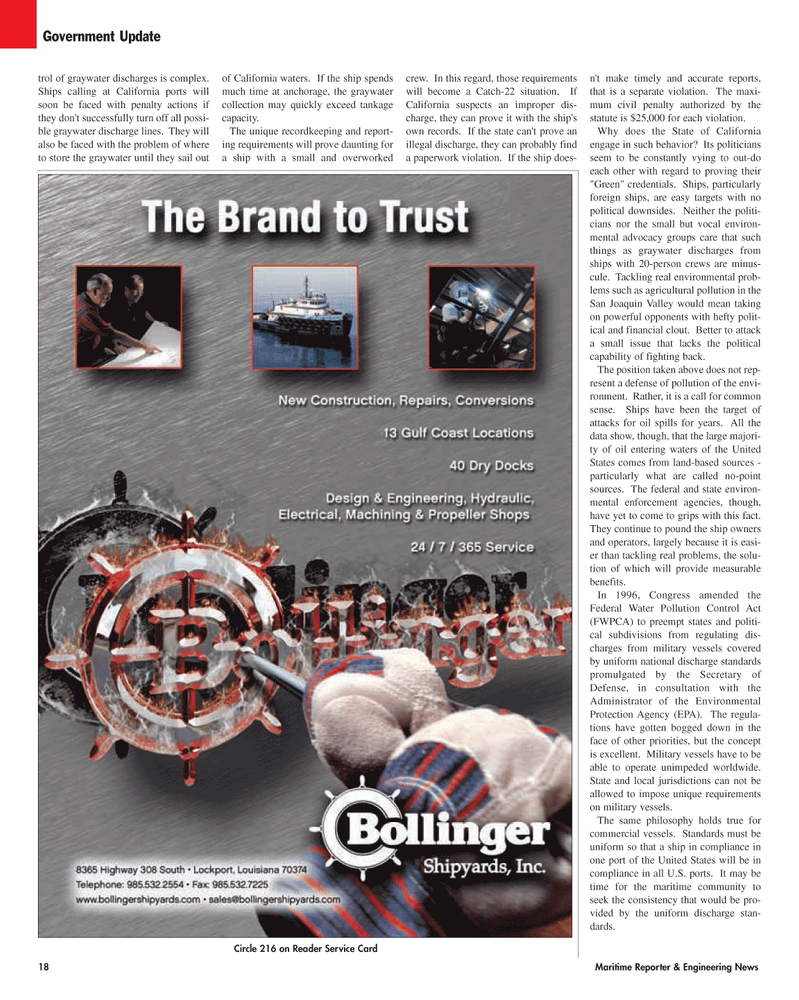
Page 18: of Maritime Reporter Magazine (November 2005)
The Workboat Annual Edition
Read this page in Pdf, Flash or Html5 edition of November 2005 Maritime Reporter Magazine
trol of graywater discharges is complex.
Ships calling at California ports will soon be faced with penalty actions if they don't successfully turn off all possi- ble graywater discharge lines. They will also be faced with the problem of where to store the graywater until they sail out of California waters. If the ship spends much time at anchorage, the graywater collection may quickly exceed tankage capacity.
The unique recordkeeping and report- ing requirements will prove daunting for a ship with a small and overworked crew. In this regard, those requirements will become a Catch-22 situation. If
California suspects an improper dis- charge, they can prove it with the ship's own records. If the state can't prove an illegal discharge, they can probably find a paperwork violation. If the ship does- n't make timely and accurate reports, that is a separate violation. The maxi- mum civil penalty authorized by the statute is $25,000 for each violation.
Why does the State of California engage in such behavior? Its politicians seem to be constantly vying to out-do each other with regard to proving their "Green" credentials. Ships, particularly foreign ships, are easy targets with no political downsides. Neither the politi- cians nor the small but vocal environ- mental advocacy groups care that such things as graywater discharges from ships with 20-person crews are minus- cule. Tackling real environmental prob- lems such as agricultural pollution in the
San Joaquin Valley would mean taking on powerful opponents with hefty polit- ical and financial clout. Better to attack a small issue that lacks the political capability of fighting back.
The position taken above does not rep- resent a defense of pollution of the envi- ronment. Rather, it is a call for common sense. Ships have been the target of attacks for oil spills for years. All the data show, though, that the large majori- ty of oil entering waters of the United
States comes from land-based sources - particularly what are called no-point sources. The federal and state environ- mental enforcement agencies, though, have yet to come to grips with this fact.
They continue to pound the ship owners and operators, largely because it is easi- er than tackling real problems, the solu- tion of which will provide measurable benefits.
In 1996, Congress amended the
Federal Water Pollution Control Act (FWPCA) to preempt states and politi- cal subdivisions from regulating dis- charges from military vessels covered by uniform national discharge standards promulgated by the Secretary of
Defense, in consultation with the
Administrator of the Environmental
Protection Agency (EPA). The regula- tions have gotten bogged down in the face of other priorities, but the concept is excellent. Military vessels have to be able to operate unimpeded worldwide.
State and local jurisdictions can not be allowed to impose unique requirements on military vessels.
The same philosophy holds true for commercial vessels. Standards must be uniform so that a ship in compliance in one port of the United States will be in compliance in all U.S. ports. It may be time for the maritime community to seek the consistency that would be pro- vided by the uniform discharge stan- dards.
Government Update 18 Maritime Reporter & Engineering News
Circle 216 on Reader Service Card
MR NOVEMBER 2005 #3 (17-24).qxd 10/28/2005 9:01 AM Page 18

 17
17

 19
19
